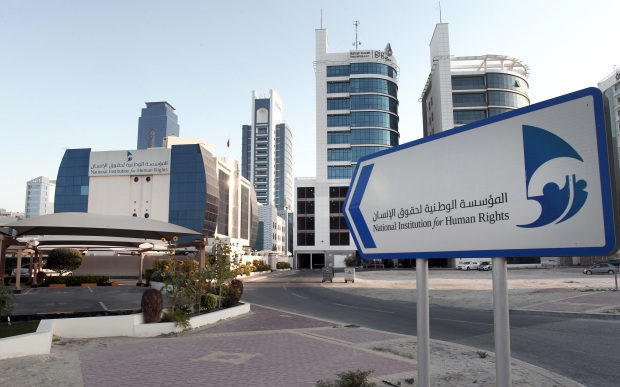19 April 2018 – In its new annual report for 2017, Bahrain’s National Institution for Human Rights (NIHR) actively endorsed some of the government’s most severe abuses, including the imprisonment of leading human rights defender Nabeel Rajab. Although 2017 was one of the worst years for Bahrain’s human rights situation since 2011, the NIHR “lauded” the government for its “enhanced commitment to democracy” and for creating a “suitable climate for freedom of thought, opinion, expression and belief.”
Today, Americans for Democracy & Human Rights in Bahrain (ADHRB) is pleased to present our analysis of the NIHR’s fifth annual report. Our analysis finds that the NIHR, which is meant to be Bahrain’s independent rights watchdog, entirely failed to objectively and accurately assess key human rights conditions in the kingdom. The NIHR remains closely connected to the government and it has yet to fully comply with the international standards governing national human rights institutions. These deficiencies are reflected in its report, with the NIHR neglecting core problems like arbitrary detention, enforced disappearance, religious discrimination, and torture. In 108 pages, the report only mentions the word “torture” eight times – all while quoting or paraphrasing international treaties or events.
ADHRB’s analysis finds that the report completely omits severe abuses like the April 2017 constitutional amendment to allow military trials of civilians and the January 2017 decree to restore power to the National Security Agency – an institution notorious for torturing protestors in 2011. The NIHR additionally failed to address the government’s crackdown on civil and political space in 2017, including the forced dissolution of the Wa’ad opposition group; baseless new charges against imprisoned political leader Sheikh Ali Salman; the arbitrary closure of the only independent newspaper, Al-Wasat; and the reprisals against the family of exiled activist Sayed Ahmed Alwadaei. Moreover, the report condemned attacks on security officials, yet failed to acknowledge any government role in violence against civilians or to even call for investigations into the two lethal raids on the peaceful Diraz sit-in, which ultimately left six demonstrators dead.
Meanwhile, the NIHR explicitly supported blatant government abuses. The report endorses the arbitrary prosecution of human rights defender Nabeel Rajab and Shia Muslim religious leader Sheikh Isa Qasim as conforming “with the basic principles of human rights,” despite criticism from nearly every independent observer from the United Nations to the US State Department. Likewise, while the annual report entirely omits cases of capital punishment in 2017, the NIHR issued a separate statement actively backing the government’s January 2017 decision to end Bahrain’s de facto moratorium on the death penalty by executing three torture survivors. The trial of the three men was so marred by torture and due process violations that a UN expert decried the firing squad executions as “extrajudicial.”
Husain Abdulla, Executive Director of ADHRB: “This is the NIHR’s first annual report since it got new leaders in 2017, but it’s clearly the same old whitewash. It’s outrageous that a national human rights institution would openly support egregious violations like unlawful executions and the jailing of human rights defenders, but that’s exactly what Bahrain’s NIHR is doing. The NIHR’s members are appointed by the king, and they consistently demonstrate that they lack any real independence from the government by towing the line on these blatant abuses – even when it means directly contradicting UN findings and the international standards the NIHR is meant to uphold. The world needs to know what a sham this institution really is.”





